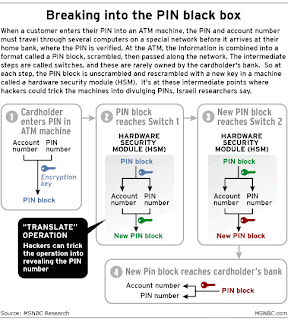 Microsoft Corp. has unveiled another reward program for Internet users who search the web using MSN.com's Live Search. Called "SearchPerks," the program awards points to users each time they use MSN Live for a search.
Microsoft Corp. has unveiled another reward program for Internet users who search the web using MSN.com's Live Search. Called "SearchPerks," the program awards points to users each time they use MSN Live for a search.Points can be redeemed for merchandise, music downloads, airline miles and other rewards. Participants get 500 points for signing up and can earn up to 25 points per day.
I have a suggestion..how about 500 points AND a HomeATM Point of Sale Device for signing up for SearchPerks! Then their CashBack Live Search partners can save even more money when their goods are purchased using the more secure HomeATM PIN Debit platform. Yeah...that's the ticket!
Essentially Microsoft is taking the "point system" used at gas stations and airports that gets cardholders prizes after they accumulate a certain number of points, and calling them "tickets" instead of "points." Each search on Live.com, MSN.com, Windows Live Hotmail, or Windows Live Messenger, is worth a ticket. Since searching is free, and people are capable of searching many more times in a day than they purchase gas or flight tickets, the company is limiting the number of tickets that can be earned in a day to 25.
While Microsoft is giving everyone 500 tickets as a bonus for signing up, the more attractive prizes still take quite a lot of searching to get; an Xbox 360 Wireless Controller costs, for example, 5,500 tickets—200 days of max Live Search usage. Among the examples that MSN provides, 525 tickets equal 5 music downloads, 1,800 tickets equal 1,000 airline miles, 1,100 tickets equal a T-shirt, 3,400 tickets equal a cookbook. Users must sign up before Dec. 31; the promotion ends April 15, 2009.
The new program joins MSN's 4-month-old Cashback initiative, which rewards shoppers with rebates when they start a search through the Live Search Cashback portal. That initiative appears to be enjoying at least limited success, reports Hitwise, an Internet site monitoring and measurement company.
While noting that the Cashback initiative does not appear to have moved the needle on market share vs. other search engines, Hitwise reports that the share of MSN users who go to the Cashback section has increased from 3.75% 11 weeks ago to 6.29% last week.
Hitwise notes that the program may have at least stopped Microsoft's MSN.com Live Search from losing further market share to Google. "Everyone is aware that the share of searches on Google has continued to increase, but over the past three months, the share of searches on MSN"s search properties has remained consistent," says Heather Dougherty, director of research at Hitwise. 55% of MSN Cashback users are women, 22% were 25 to 34 years old and 27% were 35 to 44. Just under one-fifth had annual household incomes over $100,000.









